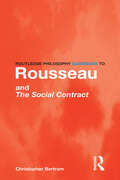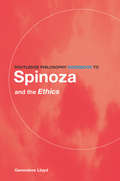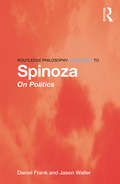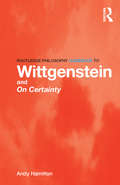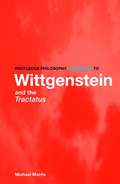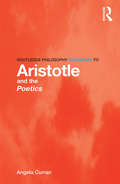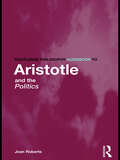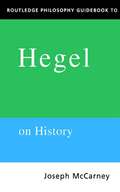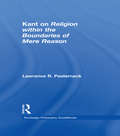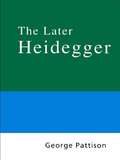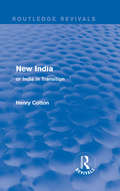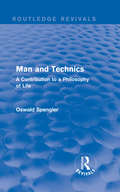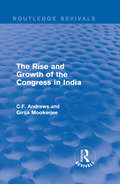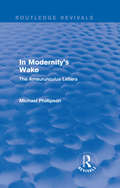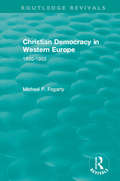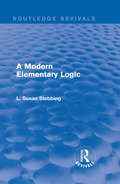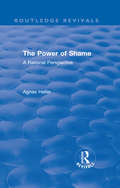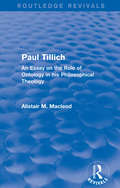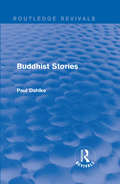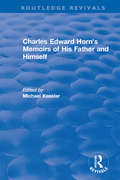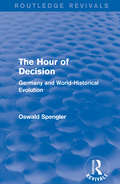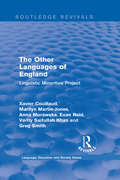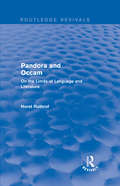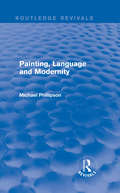- Table View
- List View
Routledge Philosophy GuideBook to Rousseau and the Social Contract (Routledge Philosophy GuideBooks)
by Christopher BertramRousseau's Social Contract is a benchmark in political philosophy and has influenced moral and political thought since its publication. Rousseau and the Social Contract introduces and assesses:*Rousseau's life and the background of the Social Contract*The ideas and arguments of the Social Contract*Rousseau's continuing importance to politics and philosophyRousseau and the Social Contract will be essential reading for all students of philosophy and politics, and anyone coming to Rousseau for the first time.
Routledge Philosophy GuideBook to Spinoza and the Ethics (Routledge Philosophy GuideBooks)
by Genevieve LloydSpinoza is a key figure in modern philosophy. Ethics is his most studied and well known work. Being both up-to-date and clear, this Guidebook is designed to lead the reader through this complex seminal text.Spinoza's Ethics introduces and assess:* Spinoza'a life, and its connection with his thought* The text of the Ethics* Spinoza's continuing relevence to contemporary philosophy
Routledge Philosophy GuideBook to Spinoza on Politics (Routledge Philosophy GuideBooks)
by Daniel Frank Jason WallerBaruch Spinoza is one of the most influential and controversial political philosophers of the early modern period. Though best-known for his contributions to metaphysics, Spinoza’s Theological-Political Treatise (1670) and his unfinished Political Treatise (1677) were widely debated and helped to shape the political writings of philosophers as diverse as Rousseau, Kant, Marx, Nietzsche, and (although he publicly denied it) even Locke. In addition to its enormous historical importance, Spinoza’s political philosophy is also strikingly contemporary in its advocacy of toleration of unpopular religious and political views and his concern with stabilizing religiously diverse democratic societies. The first Guidebook to Spinoza’s political writings, The Routledge Philosophy Guidebook to Spinoza on Politics covers the following key points: Spinoza’s life and the background to his philosophy the key themes and arguments of the Theological-Political-Treatise and Political Treatise the continuing importance of Spinoza’s work to philosophy. This book is an ideal starting point for anyone new to Spinoza and essential reading for students of political philosophy and seventeenth-century philosophy.
Routledge Philosophy GuideBook to Wittgenstein and On Certainty (Routledge Philosophy GuideBooks)
by Andy HamiltonLudwig Wittgenstein is arguably the most important philosopher of the twentieth century. In On Certainty he discusses central issues in epistemology, including the nature of knowledge and scepticism. The Routledge Philosophy Guidebook to Wittgenstein and On Certainty introduces and assesses: Wittgenstein's career and the background to his later philosophy the central ideas and text of On Certainty, including its responses to G.E. Moore and discussion of fundamental issues in the theory of knowledge Wittgenstein's continuing importance in contemporary philosophy. This GuideBook is essential reading for all students of Wittgenstein, and for those studying epistemology and philosophy of language. On Certainty, Wittgenstein's final work, addresses a category of "world-picture" propositions discovered by G.E. Moore. These challenge Wittgenstein's enduring commitment to a well-defined category of empirical propositions, and help to generate a critique of scepticism. Developing Wittgenstein's view that scepticism is self-undermining, the Guidebook offers a combative yet therapeutic interpretation that locates On Certainty between the standpoints of Kant and Hume.
Routledge Philosophy GuideBook to Wittgenstein and the Tractatus (Routledge Philosophy GuideBooks)
by Michael MorrisWritten by a leading expert, this is the ideal guide to the only book Wittgenstein published during his lifetime, the Tractatus Logico-Philosophicus. Michael Morris makes sense of Wittgenstein’s brief but often cryptic text, highlighting its key themes. He introduces and analyzes: Wittgenstein’s life and the background to the Tractatus the ideas and text of the Tractatus the continuing importance of Wittgenstein's work to philosophy today, Wittgenstein is the most important twentieth-century philosopher in the English speaking world. This book will be essential reading for all students of philosophy of language and metaphysics.
Routledge Philosophy Guidebook to Aristotle and the Poetics (Routledge Philosophy GuideBooks)
by Angela CurranAristotle’s Poetics is the first philosophical account of an art form and the foundational text in aesthetics. The Routledge Philosophy Guidebook to Aristotle and the Poetics is an accessible guide to this often dense and cryptic work. Angela Curran introduces and assesses: Aristotle’s life and the background to the Poetics the ideas and text of the Poetics the continuing importance of Aristotle’s work to philosophy today.
Routledge Philosophy Guidebook to Aristotle and the Politics (Routledge Philosophy GuideBooks)
by Jean RobertsAristotle's Politics is widely acknowledged as a classic and one of the founding texts of political theory and philosophy. Written by a leading expert in ancient philosophical thought, Aristotle and the Politics is a coherent guide that makes sense of an often difficult and disorganized work, carefully explaining its key themes. Jean Roberts introduces and assesses: Aristotle's life and the background to Politics the ideas and text of Politics the continuing importance of Aristotle's work to philosophy today. Aristotle is one of the most important figures in Western thought and Politics contains some of our earliest ideas about democracy. This is essential reading for all students of philosophy and political thought.
Routledge Philosophy Guidebook to Derrida on Deconstruction (Routledge Philosophy GuideBooks)
by Barry StockerJacques Derrida is one of the most influential and controversial philosophers of the last fifty years. Derrida on Deconstruction introduces and assesses: Derrida's life and the background to his philosophy the key themes of the critique of metaphysics, language and ethics that characterize his most widely read works the continuing importance of Derrida's work to philosophy. This is a much-needed introduction for philosophy or humanities students undertaking courses on Derrida.
Routledge Philosophy Guidebook to Hegel on History (Routledge Philosophy GuideBooks)
by Joseph MccarneyHegel's Introduction to the Philosophy of History remains one of the most profound and influential books on the philosophy of history. In clear and cogent terms this book:* examines the ideas and arguments of the Introduction to the Philosophy of History* explains key concepts of Hegel's system, a knowledge of which is essential for fully understanding his philosophy of history* assesses the continuing relevance of Hegel to the contemporary debate about the nature of history.
Routledge Philosophy Guidebook to Kant on Religion within the Boundaries of Mere Reason (Routledge Philosophy GuideBooks)
by Lawrence R. PasternackThroughout his career, Kant engaged with many of the fundamental questions in philosophy of religion: arguments for the existence of God, the soul, the problem of evil, and the relationship between moral belief and practice. Religion within the Boundaries of Mere Reason is his major work on the subject. This book offers a complete and internally cohesive interpretation of Religion. In contrast to more reductive interpretations, as well as those that characterize Religion as internally inconsistent, Lawrence R. Pasternack defends the rich philosophical theology contained in each of Religion’s four parts, and shows how the doctrines of the "Pure Rational System of Religion" are eminently compatible with the essential principles of Transcendental Idealism. The book also presents and assesses: the philosophical background to Religion within the Boundaries of Mere Reason the ideas and arguments of the text the continuing importance of Kant’s work to philosophy of religion today.
Routledge Philosophy Guidebook to the Later Heidegger (Routledge Philosophy GuideBooks)
by George PattisonMartin Heidegger is one of the most controversial thinkers of the twentieth century. His writings are notoriously difficult: they both require and reward careful reading.The Later Heidegger introduces and accesses:* Heidegger's life and the background to his later works* The ideas and texts of some of his influential later works, including The Question concerning Technology, The Origin of the Work of Art, and What is Called Thinking?* Heidegger's continuing importance to philosophy and contemporary thought.
Routledge Revivals (1909): or India in Transition
by Henry CottonFirst published in 1909, the purpose of this book was to draw attention to the political, social and religious changes that were taking place in India and detail how this should inform British colonial policy. The author argues that the political situation demanded decisive action as several factors had caused increasing difficulties in administration: waning enthusiasm on the part of English officials, greater tension between the governors and the governed — often caused by colonial arrogance which had been brought into sharper relief by spread of education and the growth of patriotic feeling. He also argues that the crux of India’s economic difficulties was the poverty of its people and asserts that the solution to both problems was the ‘sympathetic and systematic encouragement of her legitimate aspirations and patriotic tendencies’. In regard to the social and religious changes, the author observes that the changes are not less considerable and advises that the government should, as far as was possible, maintain the existing basis by a policy of ‘wise conservation’. This book will be of interest to students of Indian history and colonialism.
Routledge Revivals (1932): A Contribution to a Philosophy of Life
by Oswald SpenglerFirst published in 1932, this book, based on an address delivered in 1931, presents a concise and lucid summary of the philosophy of the author of The Decline of the West, Oswald Spengler. It was his conviction that the technical age — the culture of the machine age — which man had created in virtue of his unique capacity for individual as well as racial technique, had already reached its peak, and that the future held only catastrophe. He argued it lacked progressive cultural life and instead was dominated by a lust for power and possession. The triumph of the machine led to mass regimentation rather than fewer workers and less work — spelling the doom of Western civilization.
Routledge Revivals (1938): The Rise And Growth Of The Congress In India (1938)
by C.F. Andrews Girija MookerjeeFirst published in 1938, this book aims to provide a history of the rise and growth of the Indian National Congress for the general reader, covering the period from its foundation in 1885 until the beginning of the non-co-operation movement in 1920. It was intended to extend the official history of the Congress by Pattabhi Sitarammayya by making it more accessible to western readers while also giving more space to the religious and social forces in Indian history during the nineteenth century which led to the birth of the congress. It also looks at forerunner organisations like The British Indian Association before examining the history and evolution of the congress in several phases.
Routledge Revivals (1989): The Ameurunculus Letters
by Michael PhillipsonFirst published in 1988, this book attempts to tackle the problem of how to write about art, culture, and the issues of postmodernism in a style appropriate to what is being claimed. The letters are written on art’s behalf to a range of institutions and individuals, and have as their recurring concern the relation between art, culture and representation — both art as representation and how art is represented to, and for, the surrounding culture. They explore the context and viability of art through a range of themes, including writing, the aestheticisation of everyday life, style, design pleasure, fragmentation, hyphenation, technology, and the museum — drawing on materials from the visual arts, music, literature, post-structuralism, contemporary criticism, philosophy, and sociology.
Routledge Revivals: 1820-1953 (Routledge Revivals)
by Michael P. FogartyFirst published in 1957, this book is a detailed analysis on Christian Democracy, a movement backed by Protestants as well as Catholics, which has become one of the great social forces of Western Europe. It is strong in eight countries. The first half of Fogarty’s book sets out what the many Christian-Democratic movements stand for. The second part of the book shows how these movements began, how they have grown, changed, and consolidated, and how they developed into the mid-20th century. This is a broad and useful survey which delves the history, nature and significance of the Christian Democratic movements in Europe. In Fogarty’s analysis, Christian Democracy may indeed bring about a renewed unity of the Christian tradition in Western society.
Routledge Revivals: A Modern Elementary Logic (Routledge Revivals)
by L. Susan StebbingFirst published in 1943, and revised for this 1952 edition, this book was intended for use by students of philosophy and as such traditional and modern developments in logic have been combined in a unified treatment. The author envisaged this volume as filling a gap for a simple, introductory text on formal logic, written from a modern point of view, unencumbered by traditional doctrine. This title provides a thorough introduction and grounding in the philosophy of logic, and was later revised after the author’s death to correct a number of logical errors — making this edition the most complete version of the work.
Routledge Revivals: A Rational Perspective (Routledge Revivals)
by Agnes HellerFirst published in 1985, this book provides a stimulating series of inter-connected essays which address the theme of shame, which, unlike the problem of conscience, has been seldom discussed by moral philosophers. The essays focus on the ethical regulation of human action and judgement, examining both its constant and varying elements and concentrating on contemporary types of moral regulation. Professor Heller uses Aristotelian categories, such as the good life, in her discourse to present a new conception of rationality, distinguishing between shame regulation and conscience regulation of moral conduct, and arguing that shame regulation cannot be completely overcome even in an age of rationalism.
Routledge Revivals: An Essay on the Role of Ontology in his Philosophical Theology (Routledge Revivals)
by Alistair M. MacleodFirst published in 1973, this is the first book on Paul Tillich in which a sustained attempt is made to sort out and evaluate the questions to which Tillich addresses himself in the crucial philosophical parts of his theological system. It is argued that despite the apparent simplicity in his interest in the ‘question of being’, Tillich in fact conceives of the ontological enterprise in a number of radically different ways in different contexts. Much of the author's work is devoted to the careful separation of these strands in his philosophical thought and to an exploration and assessment of the assumptions associated with them. This book will be of interest to readers of Tillich and philosophers who specialise in ontology and linguistics.
Routledge Revivals: Buddhist Stories (Routledge Revivals)
by Paul DahlkeFirst published in 1913, this book presents a translation of five stories written by the the author. Each of the five stories illustrates and elucidates central concepts in Buddhist philosophy while eschewing any technical terminology. As such, this book is ideal for those seeking an accessible introduction to Buddhist philosophy and will provide a platform for further study.
Routledge Revivals: Charles Edward Horn's Memoirs of His Father and Himself (Routledge Revivals)
by Michael KasslerOriginally published in 2003, Charles Edward Horn's Memoirs of His Father and Himself is an annotated collection of the memoirs of Charles Edward Horn. They include an account of Horn’s father, Charles Frederick Horn, who arrived penniless in London in 1782 and rose to become music master to Queen Charlotte. Today he is most remembered for his pioneering publications of J.S. Bach’s music in England. Charles Edward Horn’s memoir covers his activities in England and Ireland and provide numerous details of English musical life in the Georgian era not previously known to scholars. They are supplemented in this book by transcripts of four other autobiographical accounts of the Horns, a summary of their extant correspondence and a chronology of their activities.
Routledge Revivals: Germany and World-Historical Evolution (Routledge Revivals)
by Oswald SpenglerFirst published in 1934, the majority of this book was developed just prior to the Nazi seizure of power, with additional material which reflects on its aftermath. It assessed the decline of European power and the crisis of Western civilization in the face of conflict between the ruling class and the lower classes, arguing that only by adherence to their inherited ‘Prussianism’ would Germany have the solidity to be able to combat these dangers. Despite the influence of his previous writings on key Nazi figures, his criticisms of National Socialism led to the book being banned, although not before it had been widely distributed throughout Germany. This work will be of interest to students of 20th century German and European history.
Routledge Revivals: Linguistic Minorities Project (Routledge Revivals: Language, Education and Society Series #2)
by Greg Smith Xavier Couillaud Marilyn Martin-Jones Anna Morawska Euan Reid Verity Saifullah KhanThe ‘other’ languages of England — those which originate in South and East Asia, and Southern and Eastern Europe — are now important parts of everyday life in urban England. First published in 1985, this book gives detailed information about which languages are in widespread use among children and adults, patterns of language use in different social contexts, the teaching of these community languages inside and outside of mainstream schools, and the educational implications of this linguistic diversity for all children in England. They authors argue that this continued and widespread bilingualism is a valuable potential resource for both the speakers and society as a whole.
Routledge Revivals: On the Limits of Language and Literature (Routledge Revivals)
by Horst RuthrofFirst published in 1992, this book evokes Pandora and Occam as metaphoric corner posts in an argument about language as discourse and in doing so, brings analytic philosophy to bear on issues of Continental philosophy, with attention to linguistic, semiological, and semiotic concerns. Instead of regarding meanings as guaranteed by definitions, the author argues that linguistic expressions are schemata directing us more or less loosely toward the activation of nonlinguistic sign systems. Ruthrof draws up a heuristic hierarchy of discourses, with literary expression at the top, descending through communication-reduced reference and speech acts to formal logic and digital communication at the bottom. The book offers multiple perspectives from which to review traditional theories of meaning, working from a wide variety of theorists, including Peirce, Frege, Husserl, Derrida, Lyotard, Davidson, and Searle. In Ruthrof’s analysis, Pandora and Occam illustrate the opposition between the suppressed rich materiality of culturally saturated discourse and the stark ideality of formal sign systems. This book will be of interest to those studying linguistics, literature and philosophy.
Routledge Revivals: Painting, Language and Modernity (1985)
by Michael PhillipsonFirst published in 1985, this book draws together the author’s artistic with analytical practices which had been developed over many years of sociological enquiry. It interprets a ‘work of art’ as a site on which a viewer or critic is invited to share in questioning celebration of the painting itself. The author reassesses modern painting’s relation to its own origins and to tradition in light of the emergence of ‘postmodern’ practice — exploring its engagement of fundamental questions about language and being. Also assessed is the relevance of the metaphors of writings and Reading to an understanding of painting and viewing practices — looking at painters’ writings as well as phenomenological and post-structuralist writers.
